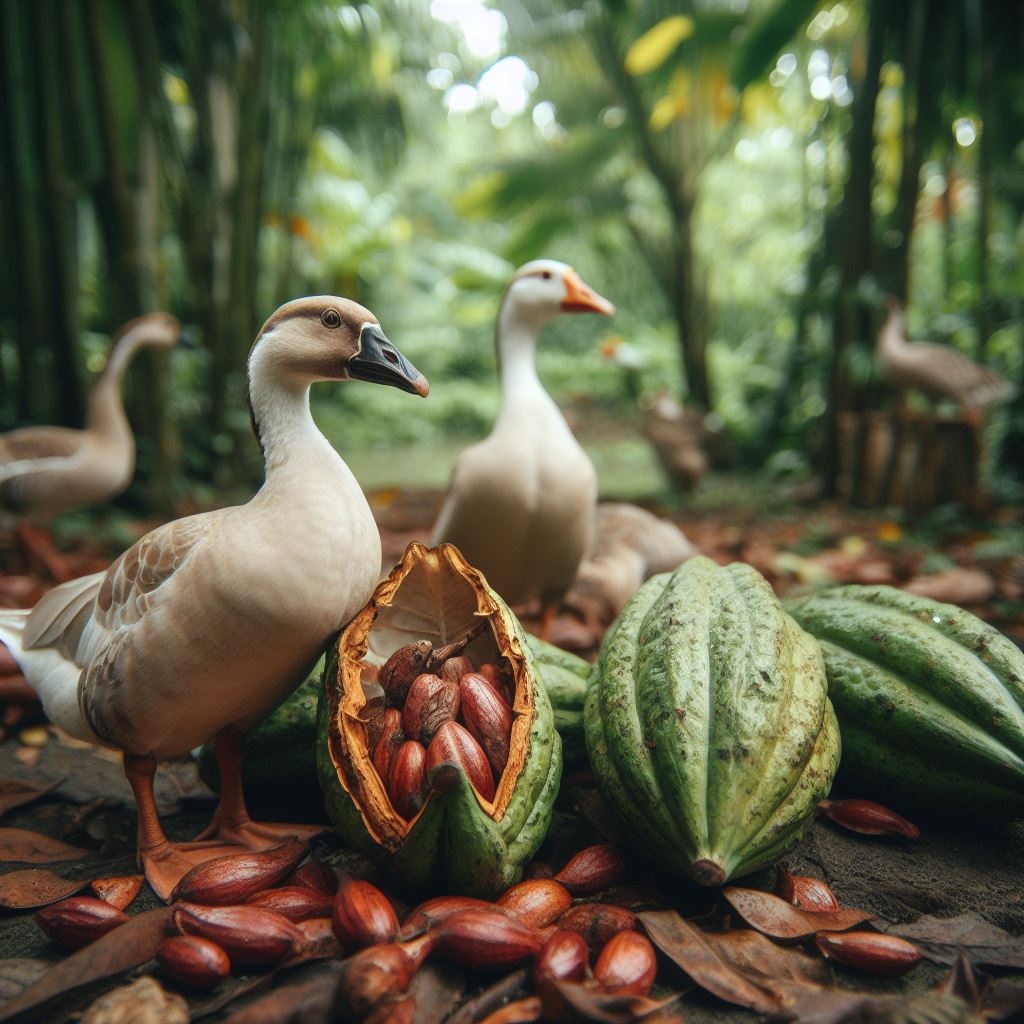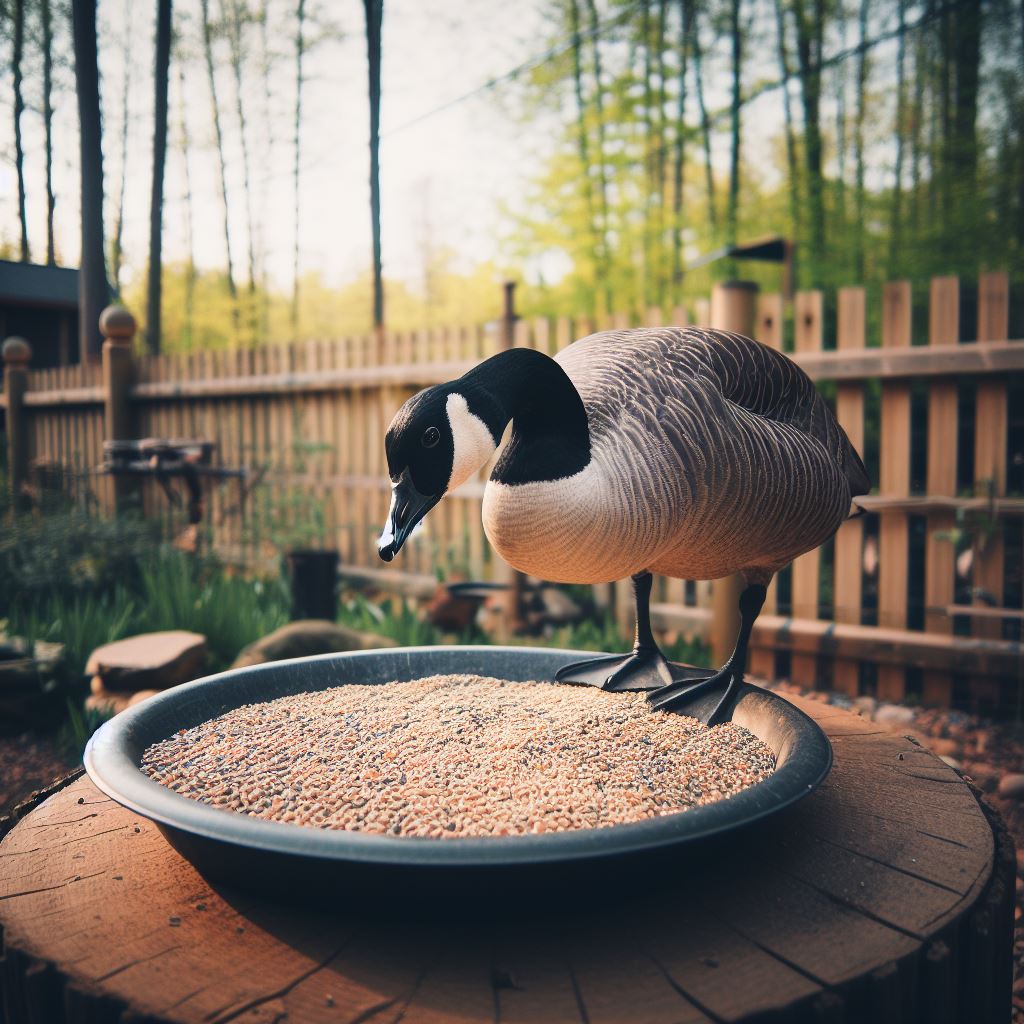Do Geese Eat Soybeans? Discover the Diet of Geese

Table of content:
- What Do Geese Eat in the Wild?
- Are Soybeans Part of a Natural Goose Diet?
- Do Backyard Geese Eat Soybeans?
- Is it Safe to Feed Pet Geese Soybeans?
- Do Migrating Geese Look for Soybean Fields to Eat?
- How Much Protein is in Soybeans for Geese?
- What are the Best Treats and Supplements to Feed Pet Geese?
- Do Geese Eat Raw or Processed Soybeans?
- Can Overfeeding Soybeans Hurt Geese?
- Are Soybeans Good for Baby Goslings?
- Final Thoughts
As herbivores, geese spend much of their time grazing and foraging for tasty plant foods to fuel their active lifestyles. This leaves many goose owners and wildlife observers wondering – do geese eat soybeans as part of their natural diet?
What Do Geese Eat in the Wild?
In their natural wetland environments, geese typically eat grasses, aquatic plants, and emergent vegetation. This can include cattails, rushes, sedges, pondweeds, and other native greenery. As geese move between wetlands, rivers, lakes, and fields, they supplement their diet with wheat, rice, corn, oats, and other crops.
During winter migrations, geese seek out leftover grains and cereals in harvested fields across North America. Berries and buds from shrubs and trees also provide essential nutrients when grasses are scarce.
Are Soybeans Part of a Natural Goose Diet?
Soybeans have become an increasingly common part of geese diets over the past century. However, soy is not considered a traditional or ancestral food source for geese in the wild.
Soybeans originated in East Asia and were not grown as a major crop in North America until the late 1800s. Widespread soybean farming expanded after World War II, providing geese with vast new food resources.
Today, soybeans make up over 90% of oilseed production in the U.S. much of it grown in the Midwest. The nutrient-rich beans have essentially become an involuntary supplement for migratory goose flocks that pass through major soybean farming regions.
Do Backyard Geese Eat Soybeans?
For backyard goose keepers, soybeans can be a healthy treat or addition to a balanced diet. Many owners choose to supplement their geese’s grazing with commercial poultry feed containing soybean meal. Offering small amounts of cooked, fermented, or sprouted soybeans is also an option.
Soybeans are rich in protein, amino acids, lecithin, and vitamin E – all beneficial nutrients for geese. However, raw soybeans contain anti-nutritional compounds that can inhibit digestion and absorption. To improve digestibility, it’s best to soak, sprout, or cook soybeans before feeding them to geese.
When introducing new foods, monitor portions to avoid overfeeding. Geese that overindulge in rich foods like soybeans may experience loose droppings or other signs of indigestion. Moderation is key for optimal nutrition and health.
Is it Safe to Feed Pet Geese Soybeans?
Yes, soybeans can be a safe, healthy addition to backyard geese diets in moderation. When preparing soybeans, it’s important to follow proper soaking, fermenting, sprouting, or cooking methods to neutralize anti-nutritional compounds.
Soaking soybeans for 8-12 hours can help reduce phytic acid and enzyme inhibitors. Sprouting beans for 1-3 days breaks down indigestible compounds while increasing vitamin levels. Fermenting soybeans into products like miso or tempeh also improves digestibility.
Cooking soybeans thoroughly ensures all trypsin inhibitors are deactivated. Offering small portions of prepared soy products 2-3 times per week is a good general guideline for pet geese.
Avoid feeding geese raw, uncooked soybeans, as they contain lectins, saponins, phytates, and other anti-nutrients that can irritate the digestive tract. With proper preparation, soybeans can be a nutritious supplement without disrupting digestion.
Do Migrating Geese Look for Soybean Fields to Eat?
Yes, soybean fields have become prime feeding grounds for migrating geese across North America. In the fall, geese stop to rest and refuel in the Midwest, which coincides with peak soybean harvest season.
Soybeans provide geese with high levels of protein and fat to sustain their long journeys. The abundant waste soybeans left behind after harvest offer easy foraging. Researchers estimate migratory geese now consume over $15 million worth of residual soybeans annually.
However, heavy grazing by dense flocks can damage young soybean plants and reduce yields for farmers. Geese also spread residual weed seeds and soybean volunteers through their droppings. As a result, soybean growers often view visiting geese as problematic pests rather than neutral travelers.
How Much Protein is in Soybeans for Geese?
Whole soybeans typically contain around 40% protein content on a dry matter basis. This makes them one of the richest plant-based protein sources available.
For comparison, other grains and legumes contain:
- Wheat: 10-15% protein
- Corn: 8-11% protein
- Oats: 12-24% protein
- Peas: 21-25% protein
The protein in soybeans has a well-balanced amino acid profile, including high levels of lysine. However, geese cannot fully utilize raw soybeans due to digestive inhibitors.
With proper preparation, the amino acids in cooked soy products can be readily absorbed. When fed in moderation, soybeans can provide supplemental protein to support muscle growth, egg production, and other metabolic functions in geese.
What are the Best Treats and Supplements to Feed Pet Geese?
In addition to a quality goose pellet, there are many healthy treat options for pet geese:
- Chopped kale or spinach – Provides vitamins A, C, and K.
- Thawed peas or corn – High in carbohydrates.
- Oats or rice – Easily digestible grains.
- Chopped berries – Antioxidants and phytonutrients.
- Cooked squash cubes – Rich in beta-carotene.
- Mealworms or crickets – Natural source of protein.
- Chopped hard boiled egg – Important fatty acids and biotin.
Supplements can also support health in backyard geese:
- Probiotics – Aid digestion and gut flora.
- Grit – Helps grind and digest fibrous foods.
- Omega-3s – For skin/feather health.
- Vitamin D3 – Maintains calcium metabolism.
- Electrolytes – Replenishes minerals.
When exploring new treats or supplements, introduce them slowly and watch for any signs of digestive upset. Moderation and variety are key for a balanced goose diet.
Do Geese Eat Raw or Processed Soybeans?
In the wild, geese primarily eat raw, unprocessed soybeans they forage from agricultural fields after harvest. However raw soybeans contain anti-nutritional factors that can inhibit digestion in geese.
For backyard flocks, it’s best to only feed geese cooked or otherwise processed soybean products. This helps deactivate digestive inhibitors and unlock the nutritional value of soy.
Some processed soy options include:
- Cooked soybeans – Boil for 3-5 minutes to deactivate inhibitors.
- Soybean meal – Product of oil extraction; digestible protein source.
- Soybean hay – Dried soybean vines; good fiber source.
- Fermented soy – Tempeh, miso, natto, etc.
- Sprouted soybeans – Improves vitamin levels.
When preparing soybeans, don’t forget to cool fully before feeding. Introduce new soy foods gradually to ensure they agree with your geese.
Can Overfeeding Soybeans Hurt Geese?
Yes, overfeeding soybeans or any rich food can potentially lead to digestive trouble in geese. While nutritious in moderation, geese did not evolve to eat soy as a major part of their diet.
Signs of indigestion from excessive soy include:
- Loose, watery droppings
- Decreased appetite
- Listlessness or low energy
- Abnormal feces staining around vent
- Visible undigested soybeans in droppings
To prevent issues, soybeans should comprise no more than 20% of total food volume offered. When introducing soy, start with small portions of 2-4 tablespoons per adult goose 1-2 times per week.
Also ensure soybeans are always properly prepared through soaking, sprouting, fermenting, or cooking before feeding. Following these precautions will allow geese to benefit from soy nutrition without adverse effects.
Are Soybeans Good for Baby Goslings?
While soybeans offer nutritional benefits, they may not be the best choice when raising young goslings. Baby geese have sensitive digestive systems and do not produce the enzymes needed to properly digest soy until around 4-6 weeks old.
For the healthiest start, goslings should be fed a complete starter feed specifically formulated for juvenile waterfowl. This provides balanced nutrition for proper growth and development.
Once mature enough, goslings may enjoy small portions of cooked soy mixed into their feed ration. But raw or unprocessed soybeans should be avoided for baby birds under any circumstances.
With the proper preparations and feeding routine, soybeans can be a healthy supplemental food source for grown geese without disrupting digestion. Used in moderation, soy contributes useful protein, amino acids, healthy fats and other nutrients to support your flock’s wellbeing.
Final Thoughts
While not a traditional part of their ancestral diet, soybeans have become a common seasonal food source for many goose flocks today. Migrating geese gravitate towards soybean fields for nourishment during long journeys. For backyard birds, properly prepared soybean products can provide supplemental protein and variety.
However, soy should never outweigh natural forage, greens, and balanced feed in a goose’s daily menu. With caution and moderation, soybeans can be a beneficial addition to a well-rounded diet for your gaggle.
Welcome. I’m Adreena Shanum, the proud owner of this website, and I am incredibly passionate about animals, especially poultry. I founded adreenapets.com as a labor of love, stemming from my desire to share my knowledge and experiences with poultry enthusiasts worldwide.




